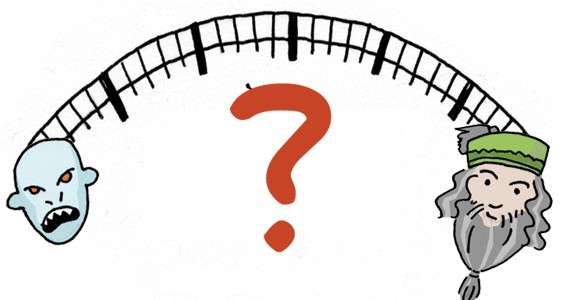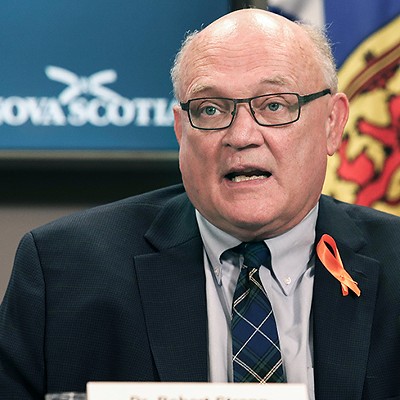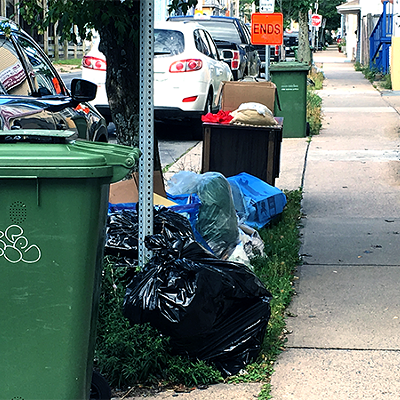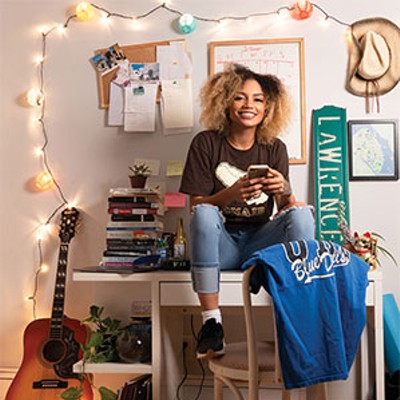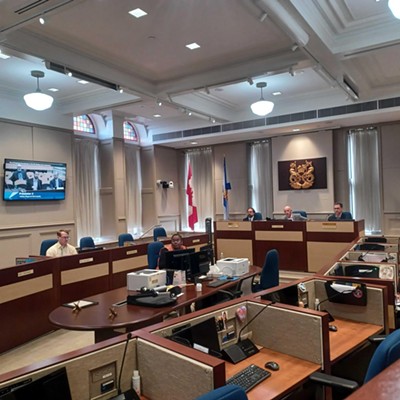As Hogwarts headmaster, Dumbledore stood up to government influence within his school and made sure that the seven years of education it offered would be relevant to students after graduation. Halifax needs a Dumbledore to stand up for accessible education and relevant jobs for students, but it's a tough role to play when you've got to balance so many conflicting interests.
The university presidents were given a personality test with Dumbledore in mind, and also asked where they stand on issues relevant to students.
Anne Leavitt president as of 2011 - University of King's College
It wasn't Anne Leavitt's appearance that first made the Delores Umbridge impression, despite her short stature or the heavy amber amulet hanging from her neck like a warmer version of Slytherin's locket. It was when, six minutes into our interview, she refused to sacrifice herself for a cause, even hypothetically. She thought it was beside the point to do so, and there weren't any causes she could think of that merited such a dramatic response.
"There are lots of things we have to debate about and some tough problem solving to do surrounding the environment and division of income," but she said she would not sacrifice her life for any problems in her immediate world at this time. "In another place I very well might," she said.
It sounds logical, sure, but it smells of self-preservation, a character trait that followed Umbridge through the fifth book until she was carried off by furious centaurs. Leavitt was the only president of the five who wouldn't choose when asked "If you were going to sacrifice yourself for a cause, what would it be?" The presidents of SMU, Dalhousie and NSCAD chose their families, while the MSVU president chose peace.
Twenty minutes later, the King's president said although she supports students protesting against tuition hikes, she wouldn't stand alongside them. This in itself wasn't a shock given her position, but her reason was surprising:
"Presidents work more effectively in quieter ways with government, in part because it's important for presidents to be on reasonably good terms with government, which doesn't necessarily mean agreeing with them, but it's also important that presidents not embarrass premiers when they're trying to work in common to the mutual benefit of each," she said.
Potter fans will remember Umbridge's loyalty to the ministry and her attempts to gain government influence within Hogwarts boundaries. Though she believes in access to education, Leavitt justified recent tuition hikes by citing government cuts and a need for students to appreciate their education.
To be fair, Leavitt was an unabashed realist during our chat. She also utterly lacked the prejudice, sadism and hunger for power that characterize Umbridge. (She lacked kittens in her presence, too, which was disappointing.)
She had the decisive intellectual traits of Ravenclaw, even if students may disagree with her conclusions. In her opinion, the biggest perk of her job is the ability to call anyone on campus into her office for a chat. She's especially interested in speaking with students. Take her up on it.
Tom Traves president since 1995 - Dalhousie University
If Tom Traves is Snape, he is Snape in the sense that he is the most misunderstood of the university presidents. Students and faculty have historically expressed unhappiness with some of his decisions in the form of strikes, editorials in the Dalhousie Gazette and Facebook groups. Recent government cuts of four percent to education have forced Dalhousie to raise tuition and make clumsy cuts across every faculty. One cut fell on the part-time position of an educator for students with learning disabilities.
Traves and his higher-ups were able to absorb some of the cost, but he still relied on the Dalhousie Student Union to make up for a chunk of the shortfall. Snape punished Gryffindors more than those in his own house, and proved to be unnecessarily harsh at times.
Backlash from his unpopular decisions may explain why Traves was guarded throughout our interview and chose to sit uncomfortably far away from me in his office. But just as Harry saw Snape's memories and finally understood his malice, a hint of Traves' background found its way across the room. Traves, who has been president of Dalhousie since 1995, believes his biggest accomplishment to date has been ensuring the future of the university, which he says was substantially underfunded, research grants were under threat and labour relations with faculty were in constant turmoil when he came into office.
For the past two years, Dalhousie has been discussing faculty pensions diplomatically rather than explosively. Traves said he doesn't anticipate a strike this time around, so students shouldn't worry about classes being interrupted.
It appears he's learned from past events. There have been blips, of course, but Traves says his background in history and his ability to see the big picture have put Dalhousie in a better position than it was.
"The university has moved forward from a sense of questioning its future," he says, "to a sense of real confidence in its future."
Snape may have been the bad guy and Traves may be perceived as adversarial, but the big picture proves otherwise. Perhaps Dalhousie is Traves' Lily Potter.
David B. Smith president since 2006 - NSCAD University
With his winning smile, good looks, musical voice and willingness to immediately talk about himself, David B. Smith reminds me distinctly of Gilderoy Lockhart, the famous Defense Against the Dark Arts professor. In fact, Smith begins, he once met the actor who plays Severus Snape who was quite wonderful though he can't remember his name (Alan Rickman). They had a photo taken together, but he wouldn't show it to me because it "wasn't great."
Smith inhabits the topmost floor of a school with narrow hallways, secret tunnels and staircases reminiscent of hamster wheels. Several roundabout corners and abrupt doors later, the building opens to reveal Smith's lofty office filled with daylight and mostly green objects.
Along the walls hang examples from the president's personal art collection: utilitarian pottery, a murky oil painting that almost appeared to move, and an odd piece I didn't notice until Smith pointed it out as one of his favourites. It's a rectangular mechanical sculpture made of maybe 100 pottery icicles on vertical strings. Once warmed up it makes the most charming sound of tinkling raindrops.
It was Dumbledore's office that contained many whirring, clicking instruments. Smith's had no Pensieve in sight.
His early business background hints at Slytherin beginnings, so I asked whether he thought his school's programs were relevant in the present economy; he predictably answered that creative and critical thinkers were always in demand. When discussion turned to who would employ them---investors with an eye for profit---Smith denied that art and business were fundamentally in conflict.
"Absolutely not. Not even close," he said. "When I talk about art I talk about the creative process because art comes out of that. Business also has to come out of that, and this is why: Business only becomes profitable if it innovates. If it goes stagnant, it goes bankrupt."
It's the same stance held by advocates of Canada's latest catch phrase "the creative economy," used to bind art and business based on a need for constant innovation. Perhaps our definitions of art are simply different.
"Our grads are more likely to become entrepreneurs and small business owners than simply go off and get a job that they've received vocational training for," Smith said.
As for Gryffindor attributes, the president recently launched an arts school for students in South Africa that two NSCAD artists will get to visit each year.
J. Colin Dodds president since 2000 - Saint Mary's University
When I asked J. Colin Dodds which animal he would be---lion, snake, badger or eagle--- he first wanted to know: "If I were a lion, would I be a male lion or a female lion?" I told him he could be any gender of lion he likes---he could even be a transgendered lion. To this he responded in his distinctive British accent: "Oh no, I have enough problems just being a man, let alone anything else."
The president with a background in finance, science and arts gave the animal question long and apparently serious pause, at one point leaning toward the eagle because it was a killer; but then it struck him that all the beasts were killers. He settled at last on the eagle for its freedom and ability to see from a different perspective. It was one of his more decisive answers, leading me to wonder if, like Flitwick, he had charmed wings onto my questions so they wouldn't open any doors.
As we conversed, his decaffeinated Tim Hortons tea lost its steam and the Harry Potter personality quiz veered wildly off-course and Dodds brought up his own demise:
"As you get older you tend to reflect on this more, I think. I don't know whether it's just an aging issue or as you perceive your increased mortality."
He said two of his friends had recently died---one older than him, one younger, and death was happening around him with increased frequency.
"You realize that---as you must realize--- that we're all going to die. It's just that at your age, the chances of you dying young are relatively slight...you can block it out. You can say, 'That's terrible, but it's not going to happen to me'...so I think younger people---I've been one obviously in the past--- we have some confidence that these things aren't going to have an impact on us."
It was a Dumbledore moment like no other. Knowing he didn't have long to live, the Hogwarts headmaster sacrificed himself for the greater good: the end of Voldemort's siege on muggles and their wizard comrades.
"As you get older," Dodds said, "certainly I am questioning more: What's it all about?"
Dodds would sacrifice himself for his family. He also considers them his greatest accomplishment.
An upper-year student paid him a visit prior to our interview, so Dodds took the time to meet with him. He's directly involved in student work, so he feels responsible for their successes, and presumably their failures. He agrees with the most recent tuition hikes, but advises balance between what the public pays and what students pay.
"Education is the new currency," he said.
Ramona Lumpkin president since 2010 - Mount Saint Vincent University
Perhaps it's because she's read and loved all the books, or because she double-majored in English and psychology, but Ramona Lumpkin rings of J.K. Rowling herself. Rowling's ability to see the motivations of her characters and how they play out lines up precisely with Lumpkin's answers about her own strengths and weaknesses. Lumpkin believes her greatest strength is empathy--- that ability to understand, and feel, other perspectives.
The president of a school where 60 percent of faculty and 80 percent of students are women, Lumpkin is an openly proud feminist (and she hopes you are too). She thinks men and women have common goals, but the F-word has suffered years of negative connotations at the hands of opponents. She doesn't think that her position as one of three female university presidents in a province of 12 university presidents constitutes an old boys' club; she thinks it's unintentional, just like the mere 20 percent of female university presidents across the country is unintentional.
"It takes time for women to build their own authorization---being authorized to have power...you need a critical mass for that to grow over time. We need to be conscious of the deficit and keep it front and centre, because otherwise I think it's possible to slide back."
When asked the same question, Dalhousie's Traves said he wouldn't be surprised if there were a woman in his chair two decades from now, given the soaring female enrollment in universities.
Lumpkin admits her greatest weakness is impatience, which may explain her belief that activism is the most legitimate way to promote a cause. She has an unabashed love of George Elliot---the female author with a male alias. Lumpkin would die for peace.
Don Bureaux president since 2010 - Nova Scotia Community College
College president Don Bureaux must be sipping Polyjuice Potion. No one has seen or heard from him in the last two weeks. Perhaps, like Death Eater Bertemius Crouch Jr., he's disguised as your Defense Against the Dark Arts professor this very minute. Does he often drink from a hip flask? Does he perform unforgivable curses on spiders? Is he creepily obsessed with the Dark Lord? If so, you'd best report him to The Coast.
Meanwhile, pesky magical creatures plagued my communication with NSCC's press people. Their email replies didn't send, and it took them 10 days after my initial interview request to reach me. Luna Lovegood was right---Nargles do exist!

